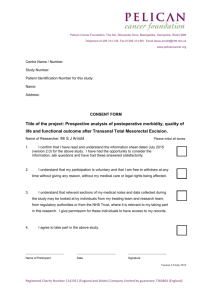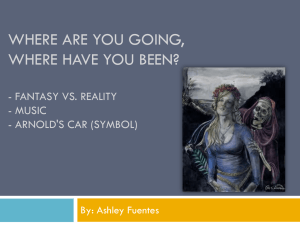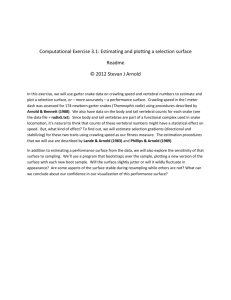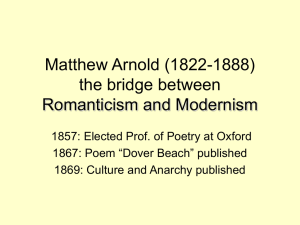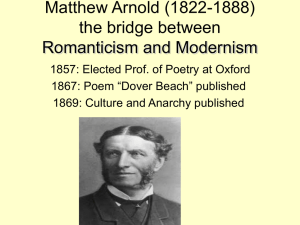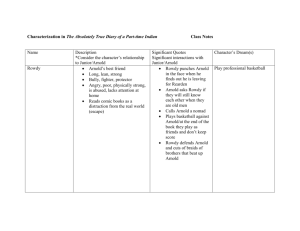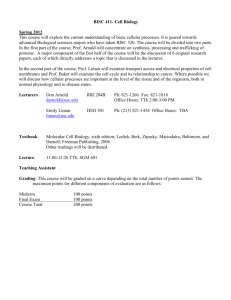The 19th century, Part One
advertisement
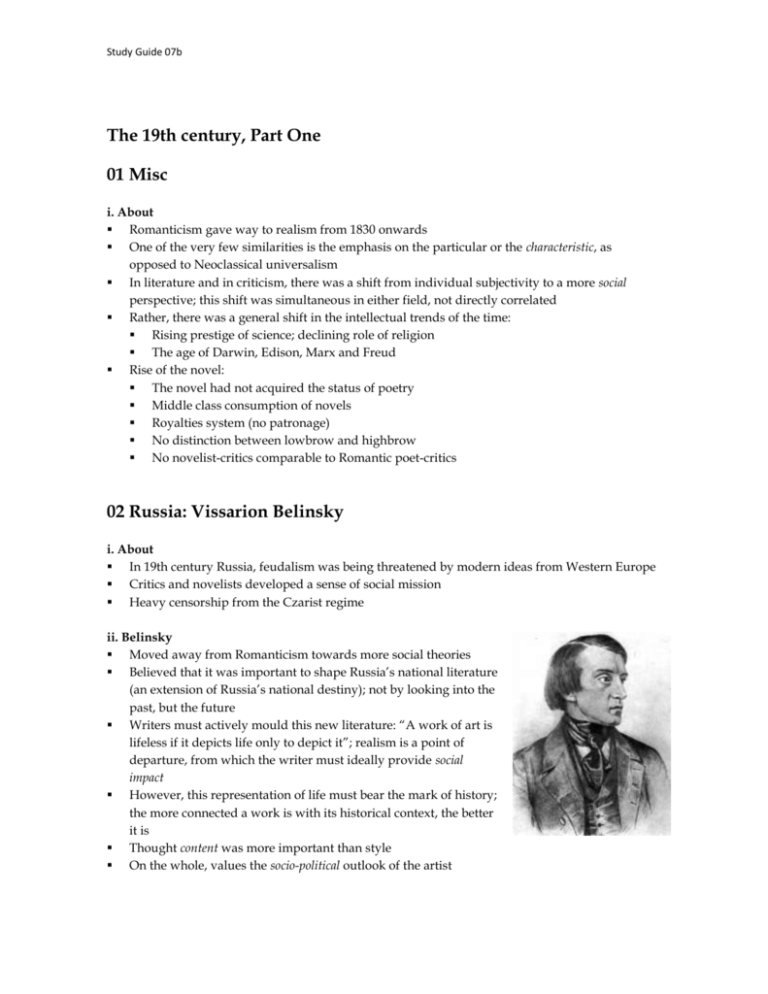
Study Guide 07b The 19th century, Part One 01 Misc i. About Romanticism gave way to realism from 1830 onwards One of the very few similarities is the emphasis on the particular or the characteristic, as opposed to Neoclassical universalism In literature and in criticism, there was a shift from individual subjectivity to a more social perspective; this shift was simultaneous in either field, not directly correlated Rather, there was a general shift in the intellectual trends of the time: Rising prestige of science; declining role of religion The age of Darwin, Edison, Marx and Freud Rise of the novel: The novel had not acquired the status of poetry Middle class consumption of novels Royalties system (no patronage) No distinction between lowbrow and highbrow No novelist-critics comparable to Romantic poet-critics 02 Russia: Vissarion Belinsky i. About In 19th century Russia, feudalism was being threatened by modern ideas from Western Europe Critics and novelists developed a sense of social mission Heavy censorship from the Czarist regime ii. Belinsky Moved away from Romanticism towards more social theories Believed that it was important to shape Russia’s national literature (an extension of Russia’s national destiny); not by looking into the past, but the future Writers must actively mould this new literature: “A work of art is lifeless if it depicts life only to depict it”; realism is a point of departure, from which the writer must ideally provide social impact However, this representation of life must bear the mark of history; the more connected a work is with its historical context, the better it is Thought content was more important than style On the whole, values the socio-political outlook of the artist Study Guide 07b iii. The 3 Radicals: Nikolai Chernyshevsky, Nikolai Dobrolyubov, Dimitri Pisarev Nikolai Chernyshevsky, Nikolai Dobrolyubov, Dimitri Pisarev were self-proclaimed followers of Belinsky Shared his concern for Russia’s national destiny and the sociopolitical outlook (Chernyshvesky founded Narodism), but took it to its logical conclusion Belinsky favoured content over style; the 3R did away with aesthetics altogether; art is subjective, nature is more ‘real’ Profound impact upon postmodernism: critic as social theorist; text beyond the influence of the author 03 England: Matthew Arnold i. About England under Queen Victoria was especially proud of itself; it has economic, political and scientific advances unsurpassed by the rest of Europe This contrast is even more apparent when set against 19th century Russia (who had no middle class to speak of) This would explain Arnold’s conservatism as opposed to the radicalism or revolutionary nature of the Russian critics The mid-Victorian era in England set itself against the Romantics; the Romantics’ emphasis on individuality had forsaken the social element of culture, and their excesses had turned into social degeneration And given the decline of religion in general, literature sought to take its place as a beacon of morality; ‘art for life’s sake’ Generally, this new emphasis on morality of the period recalls Neoclassicism, but it was not as backward-looking; the genius of the Romantics was not overlooked And it can be said to be situated between both currents, embodied by Arnold himself ii. Arnold Arnold’s primary struggle was to reconcile the Romanticism of his youth with his strict father’s inculcation of the classics within him But noticed that because of the advances of 19th century England, and the self-interestedness of the Romantics, society began to surrender to amorality and materialism Study Guide 07b Culture was being sacrificed to machinery: “The idea of perfection as an inward condition of the mind and spirit is at variance with the mechanical and material civilisation in esteem with us.” Culture was also being sacrificed to self-centredness: Arnold rallied against “our string individualism, our hatred of all limits to the unrestrained swing of the individual’s personality, our maxim of ‘every man for himself’ Unlike the Russians, Arnold thought cold, hard science was insufficient to form the worldview of his age, or at least take the place of the arts; the natural tendency of the human mind is to unify, and science only dealt out disparate facts Arnold proposed to fill the spiritual void with literature—that it should take its place, or at least induce the quasi-religious solemnity associated with religion And literature, like religion, should be timeless: it must emphasise “elementary, permanent feelings” against provincialism or individual inclinations (NC) Reading literature thus becomes not an end in itself, but to affect large-scale social improvement However, literature is to serve this social function not by becoming more socially purposive, but by remaining literary; it should reject all external political and practical ideas Arnold also emphasised morality in literature, though not entirely in the neoclassical sense; instead of preaching a particular moral, literature should be conducive towards a general capacity for morality: “a poetry of revolt against moral ideas is a poetry of revolt against life; a poetry of indifference towards moral ideas is a poetry of indifference towards life” (Rom) The moral/religious mood of solemnity can be found in certain infallible touchstones of literature These infallible touchstones are marked by a grand style (content + style), akin to Longinus’ concept of the sublime These touchstones function as markers of quality; instead of some abstract definition of what makes good literature, these touchstones serve as ‘proof’ of quality 04 Karl Marx i. Marx Marx believed that man’s social existence is primary, and his mental consciousness secondary It is not some innate consciousness in man that determines his social being, but his social being that determines his consciousness This includes his subjective human sensibility (aesthetic tastes); it is socially constructed, and not an autonomous, independent force Social practice also affects the artist: an artist’s ‘talents’ are only deemed necessary or profitable by the tastes of his age, and are even shaped by these tastes Thus, artistic production is still commodified (the object being separate from its maker), because of its linkage to industry Study Guide 07b Even the conditions necessary for mythological invention are lost: “all mythology subdues, controls and fashions the forces of nature in the imagination and through the imagination; it disappears therefore when real control of these forces is established” A particular society at a particular time cannot be homogenised under a single zeitgeist (spirit of the time), because this view doesn’t take into account the underlying oppositional forces at work If one cultural pattern is dominant, it is so at the expense of another: the dominant culture is disseminated by the ruling class over the lower classes The class that controls material production also controls mental production And this mental production is given the semblance of universality, or being eternal
